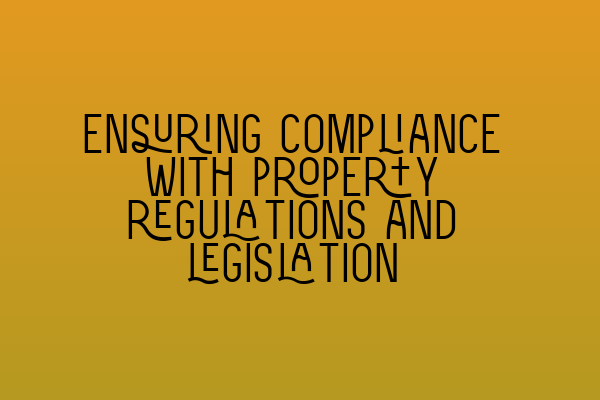Ensuring Compliance with Property Regulations and Legislation
As a property owner or investor, it is crucial to understand and comply with the various regulations and legislation governing the property sector. Failing to do so can result in legal issues, hefty fines, and damage to your reputation. In this blog post, we will explore some key regulations and legislation that you need to be aware of, and provide tips on how to ensure compliance.
1. Planning and Building Regulations:
When it comes to property development and renovations, planning and building regulations play a significant role. It is essential to obtain the necessary planning permission before initiating any construction work. This permission ensures that the proposed development aligns with local zoning and environmental regulations. Additionally, building regulations ensure that the construction meets the required safety and accessibility standards. For more information on planning and building regulations, you can refer to this article on SQE 1 Practice Exam Questions.
2. Health and Safety:
Safety should always be a top priority, both for property owners and occupiers. Property owners are legally obligated to take reasonable steps to ensure the health and safety of the occupants. This includes regular maintenance of the property, ensuring fire safety measures are in place, and conducting risk assessments. Health and safety regulations may vary depending on the type of property, so it is essential to stay updated with the latest legislation. To test your knowledge on health and safety regulations, you can take this SQE 1 Practice Mocks FLK1 FLK2 quiz.
3. Tenancy Agreements and Landlord Regulations:
If you rent out a property, you need to familiarize yourself with the relevant tenancy agreements and landlord regulations. These regulations cover various aspects, such as the rights and responsibilities of the landlord and tenant, rent collection, deposit protection, and eviction procedures. It is crucial to ensure that your tenancy agreements comply with the law to protect both parties’ interests. To gain a better understanding of tenancy agreements and landlord regulations, you can consider enrolling in SQE 2 Preparation Courses.
4. Environmental Regulations:
Environmental sustainability is gaining increasing importance in the property sector. Property owners need to be aware of environmental regulations and take steps to minimize the environmental impact of their properties. This may include implementing energy-efficient measures, waste management strategies, and reducing carbon emissions. Staying updated with the latest environmental regulations will not only help you comply with the law but also make your property more attractive to environmentally-conscious tenants.
5. Anti-Money Laundering (AML) Regulations:
AML regulations aim to prevent the property sector from being exploited for money laundering activities. As a solicitor involved in property transactions, it is your responsibility to comply with AML regulations. This includes conducting proper due diligence on clients, identifying and reporting suspicious transactions, and maintaining accurate records. To learn more about AML regulations and how they apply to the legal profession, you can explore SQE 1 Preparation Courses.
6. The Law of Property Act 1925:
The Law of Property Act 1925 is a fundamental piece of legislation that governs various aspects of property law. This act covers topics such as property ownership, leases, mortgages, and conveyancing. Understanding the provisions of this act is crucial in ensuring compliance with property laws and protecting your interests as a property owner. It is advisable to seek legal advice or consult a solicitor who specializes in property law when dealing with complex legal matters.
By familiarizing yourself with these key regulations and legislation, you can ensure compliance with property laws and mitigate any potential legal risks. It is essential to stay updated with the latest changes in regulations and seek professional advice when needed. Remember, compliance not only protects your legal interests but also contributes to a safe and secure property market.
If you are preparing for the SQE exams and want to test your knowledge of property law and regulations, you can explore the SRA SQE Exam Dates for information on examination schedules.
Disclaimer: This blog post is intended for informational purposes only and should not be considered legal advice. Always consult with a qualified solicitor for advice specific to your situation.
